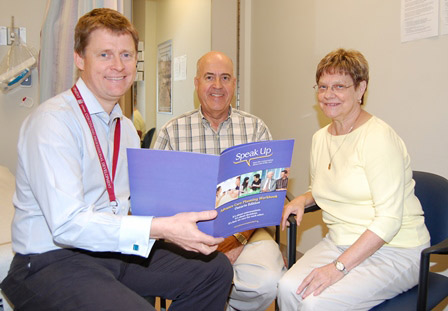
Dr. José Pereira, Chief of Palliative Medicine, is one of many doctors, nurses and allied health-care staff who are championing Advance Care Planning – especially training staff on how to have these vital conversations with patients.
Dans une vidéo de Pallium Canada, le Dr José Pereira compare le parachutisme à l’approche de la fin de la vie. Inévitablement, tous les parachutistes atteindront le sol, et 100 % des Canadiens mourront un jour. Comme le parachute, le plan préalable de soins amortira le choc.
« Tout le monde devrait avoir un plan préalable de soins », souligne le Dr Pereira, chef des Soins palliatifs à L’Hôpital d’Ottawa. « Et les professionnels de la santé doivent aborder le sujet. Sinon, c’est le silence. »
« Aider les patients à élaborer leur plan préalable de soins (voir les définitions ci-dessous) illustre bien les soins centrés sur le patient », déclare Tom Foreman, directeur, Éthique clinique et organisationnelle. « Il faut en parler même si c’est difficile. »
À L’Hôpital d’Ottawa, comme dans bien d’autres hôpitaux, parler de la planification préalable des soins et consigner les volontés des patients dans des documents facilement accessibles n’est pas systématique.
« Nous sommes au milieu du peloton, mais le peloton doit beaucoup s’améliorer », affirme le Dr Pereira.
The good news: The Ottawa Hospital is improving, through involvement in various projects, studies, training and workshops. All these tools are designed to give health-care professionals the training and confidence to have ACP discussions.
“Staff need training,” said Dr. Ruth Ellen, Geriatrician. “You can’t just send an untrained person in to talk with patients and families about ACP issues.”
Nurses often believe it’s outside their scope of practice to have ACP conversations, but that’s not true, said Lynn Kachuik, Advanced Practice Nurse in Supportive and Palliative Care. Patients may, for example, raise issues during a late-evening conversation and the nurse could record that on the patient’s chart, making it easier for the doctor to follow up later. “It’s an incremental thing, not just one conversation,” said Kachuik.
“We need to work as a team to ensure it’s done correctly, whether physician, nurse, social worker,” said Dr. Pereira. “It’s unfair to put responsibility in one professional’s hands.”
ACPs are “a gift to your family,” but they’re also a gift to health-care teams. Intensive Care Units and RACE (Rapid Assessment of Critical Events) teams often need to translate what has or hasn’t been discussed into an immediate treatment plan during a crisis, said Dr. Mike Hartwick, an intensivist and General Campus lead for the RACE team. When patients in ICU are too sick to speak for themselves, staff must support the substitute decision makers.
“They suffer greatly the burden of this role,” Dr. Hartwick said. When there is no ACP, “they suffer PTSD-like symptoms, depression, complicated bereavements. They hope they’ve done the right thing and honoured the patient’s wishes.”
Staff need training to help them feel comfortable with having ACP conversations, said Susan Smith, a member of the Cancer Program’s Patient and Family Advisory Council and a former palliative care nurse. “The person has to be totally comfortable and believe in what they’re doing,” she said. “If it doesn’t go well, you try again later. It’s an ongoing process.”

Dr. Paul Wheatley-Price (left), medical oncologist, uses the principles and approach outlined in the Speak Up Advance Care Planning Workbook when talking with families and patients, such as Claude and Rachel Rochon. “We want to upgrade the skills and empower more health-care workers to take on these tasks that were previously seen as just for palliative-care workers,” said Dr. Wheatley-Price. The Speak Up website has a wealth of support materials for health-care teams.
Some issues and advice about ACP discussions:
- Include the physicians’ explanations about the goals of care – what patients understand about their illness, what could happen, what the treatment options are.
- Keep the family physician in the loop. The hospital “needs to work closely with family physicians,” said Cathy DeGrasse, Clinical Director of the Regional Cancer Program.
- Discuss ACPs with frailty and cognitive problems in mind, since geriatric patients often come to the hospital with delirium.
- The hospital needs to document and save ACPs in inpatient and outpatient hospital files, so they’re easily accessible in a crisis. “There’s often not a lot of time to figure out the care goals, so we need something that’s quick to access,” said Dr. Ellen, who documents her ACP conversations in patients’ discharge summaries.
- ACP conversations take time, so there should be a billing code to recognize their value to the health-care system.
There’s good reason to be hopeful about the hospital’s progress with ACPs.
“This is much more on everybody’s radar now,” said Dr. Ellen. “People are trying to solve the problems.”
“I think we’re on a fantastic journey,” said Dr. Pereira. “We’re moving forward and gaining momentum.”
Know your terms:
- Advance Care Plan (ACP): It outlines patients’ wishes about their future health and personal-care preferences in case they can’t speak for themselves. Patients should: include their values and wishes; talk to their doctors about possible treatments and outcomes; name an SDM or POA; tell others about their ACP. When an ACP is written, it’s called an Advance Directive, but it can also be verbal or on video. An ACP is not a DNR (Do Not Resuscitate) order.
- Care plan: When the patient cannot participate in an ACP, the Substitute Decision Maker or Power of Attorney works with the doctor to plan the care and treatment the patient will receive, respecting the patient’s values.
- End-of-life care refers to health care provided in the last weeks of life. It focuses on comfort, symptom management and patients living the way they choose during their last weeks.
- Palliative care is not limited to the end-of-life weeks. Rather, it’s care provided to patients with life-limiting illnesses, focusing on good quality of life and keeping patients as comfortable and pain-free as possible.
- Substitute Decision Maker (SDM): Someone you appoint in your ACP to speak for you when you can’t speak for yourself. In Ontario, the POA trumps an SDM.
- Power of Attorney (POA) for personal care: A person named in a legal document to make your health-care decisions when you can’t (but not for finances – that’s a separate document). In Ontario, the POA trumps an SDM.
- Living will is an American term that has no legal standing in Canada.

Appuyez les soins aux patients et la recherche à L'Hôpital d'Ottawa


 To reset, hold the Ctrl key, then press 0.
To reset, hold the Ctrl key, then press 0.